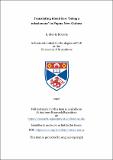Files in this item
Translating identities : 'being a missionary' in Papua New Guinea
Item metadata
| dc.contributor.advisor | Harris, Mark | |
| dc.contributor.author | Roberts, E. Mei-Li | en |
| dc.coverage.spatial | 392 p : ill., fold. maps (1 col.) 30 cm. | en |
| dc.date.accessioned | 2021-04-08T09:07:32Z | |
| dc.date.available | 2021-04-08T09:07:32Z | |
| dc.date.issued | 2006 | |
| dc.identifier.uri | https://hdl.handle.net/10023/22134 | |
| dc.description.abstract | Many studies of missionaries have taken an historical perspective, looking particularly at missionaries’ role in colonialism. However, missionaries are still very much part of contemporary Papua New Guinea (PNG), with a significant number of expatriate missionary groups working in PNG. This thesis is a study of a present day mission in PNG, SIL International, formerly known as the Summer Institute of Linguistics (SIL). It examines the way in which the mission community is constructed and the boundaries and divisions within the community itself. It attempts to challenge some of the stereotypes of missionaries and show that there are different views of what it is to ‘be a missionary’ even within the missionary community itself. I focus particularly on what it means to ‘be a missionary’ and the ambiguities and ambivalences between the ideals and realities of mission work. The focus of the study was on SIL members themselves and their identities as missionaries rather than the effect of their missionising on others. This is examined through a number of different themes. Debates about the fence surrounding the mission station highlighted the way in which it created both a physical and a symbolic boundary between those living inside the fence and the people living outside of it. Related to this were debates regarding the mission station, Ukarumpa and how SIL members should ‘communicate the gospel’. SIL’s main goal is Bible translation and the thesis explores the challenges and problems of translation, both the practical aspects of Bible translation and translating between cultures. Literacy work is also an important part of SIL’s goal and is shown to be especially significant in maintaining a good relationship with the PNG government. Finally, notions of ‘home’ and ‘belonging’, particularly in relation to the children of missionaries, and the notion of ‘citizens of heaven’ is shown to help shape SIL members’ identities as ‘missionaries’. | en |
| dc.language.iso | en | en |
| dc.publisher | University of St Andrews | en |
| dc.subject.lcc | BV3680.N5R7 | |
| dc.subject.lcsh | Missionaries--Papua New Guinea | en |
| dc.subject.lcsh | Missionaries--Papua New Guinea--Social conditions | en |
| dc.subject.lcsh | Missions--Anthropological aspects--Papua New Guinea | en |
| dc.subject.lcsh | Summer Institute of Linguistics | en |
| dc.subject.lcsh | Papua New Guinea Branch | en |
| dc.subject.lcsh | Children of missionaries--Papua New Guinea | en |
| dc.title | Translating identities : 'being a missionary' in Papua New Guinea | en |
| dc.type | Thesis | en |
| dc.type.qualificationlevel | Doctoral | en |
| dc.type.qualificationname | PhD Doctor of Philosopy | en |
| dc.publisher.institution | The University of St Andrews | en |
| dc.contributor.institution | Social Anthropology Theses | en |
| dc.identifier.doi | https://doi.org/10.17630/10023-22134 |
This item appears in the following Collection(s)
Items in the St Andrews Research Repository are protected by copyright, with all rights reserved, unless otherwise indicated.

